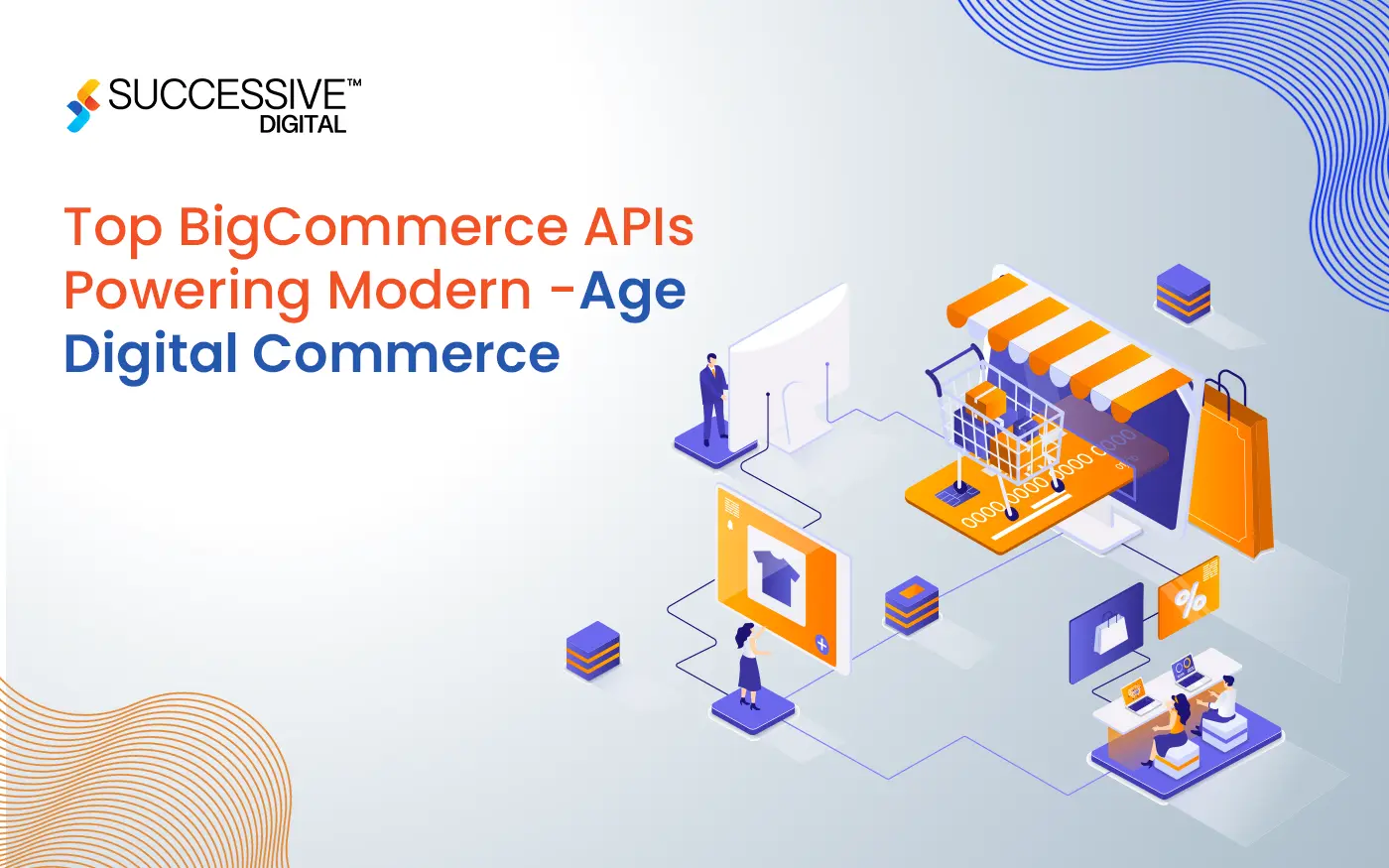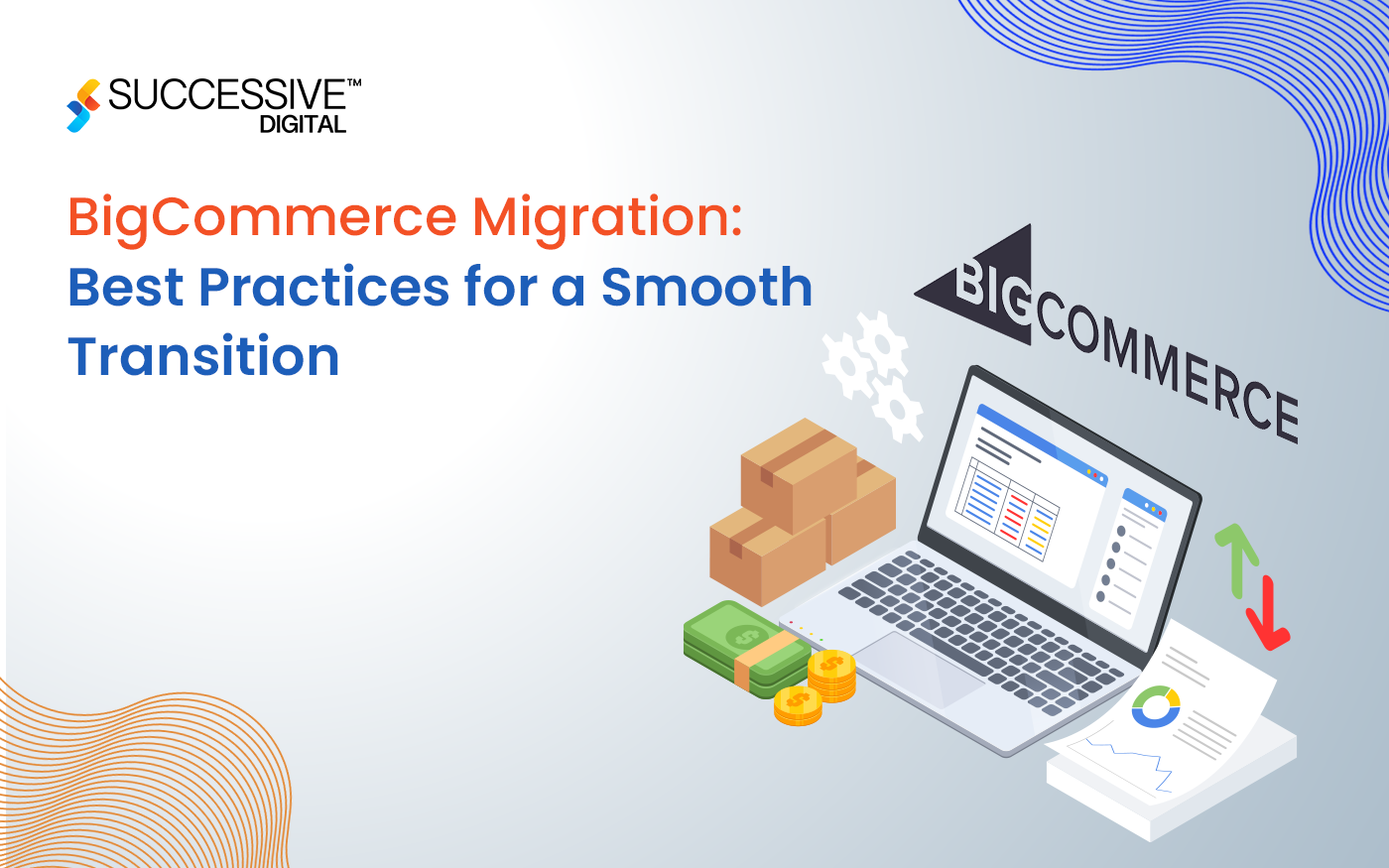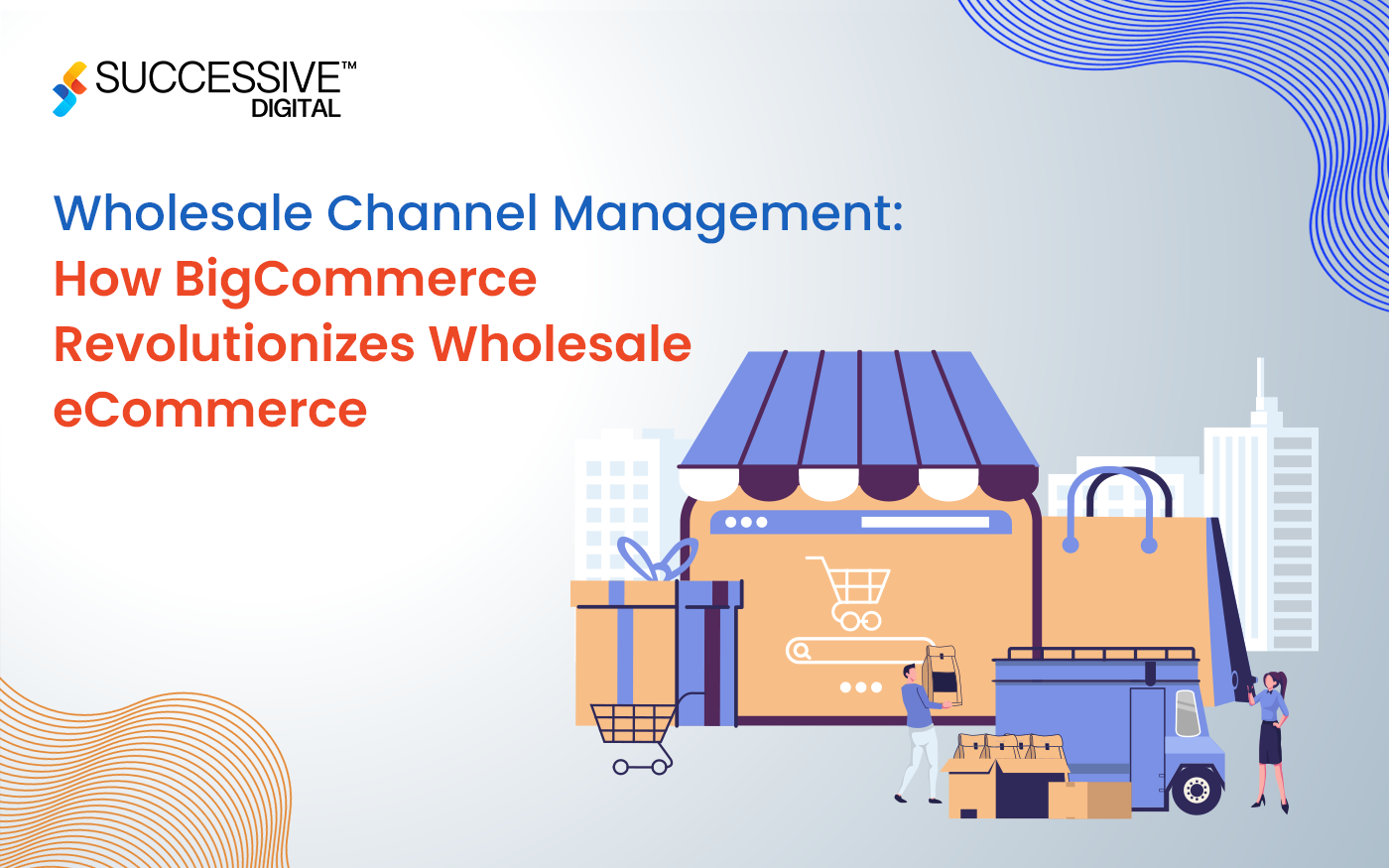The B2B business model is no longer limited to brick-and-mortar stores. It is steadily moving to the digital world and adjusting to the space that offers many opportunities for businesses to grow and expand their brand reach on a global scale. According to Forrester, the US B2B eCommerce sales are estimated to reach $3 trillion by 2027. This means that this domain has more potential than we are expecting and if B2B companies utilize digitization and ongoing trends, they are all set for long-term success.
But do you know there are still some prevailing challenges in this domain? While going digital is a green flag for B2B companies, they are yet to address the challenges that can hold them back. Let us have a look at these challenges, ongoing trends, and the role of CX and B2C experiences in the B2B eCommerce domain.
What is B2B eCommerce? A Deep Dive into Business-to-Business Online Commerce
B2B eCommerce, also known as business-to-business eCommerce, is a business model in which the online buying and selling of products and services occurs between two businesses. For example, a furniture-making company sells its products to other businesses, such as wholesalers or retailers.
Such business models comprise various activities:
- Procurement
- Supply chain management
- Wholesale distribution
- Vendor relationships
While B2C (business-to-consumer) transactions involve buying and selling between businesses and end consumers and are usually small-volume transactions, the B2B eCommerce model covers large-volume transactions where manufacturers sell in bulk to wholesalers/retailers.
B2B transactions cover negotiated contracts, bulk ordering, invoicing,and pricing structures.
Since the entire process is pushed online, a B2B eCommerce portal is utilized to streamline these transactions. Such portals include marketplaces, procurement portals, and trading networks.
These portals help in automated inventory management, order management, shipping and fulfillment, and real-time tracking.
What are the Existing Challenges in the B2B Online Commerce Space?
1. Maintaining B2B customer relationships
Maintaining stronger customer relationships is equally important in B2B eCommerce. 84% of B2B buyers say they will choose to make purchases from a supplier with whom they had a great relationship. Since the lifetime value of B2B customers is higher than that of B2C customers, it becomes more crucial to build a good relationship. However, transitioning offline B2B relationships to the digital mode can be a challenge. Additionally, building new relationships online can also be difficult since the competition is high, and B2B buyers usually find it challenging to trust new businesses.
2. Choosing the right B2B eCommerce platform
Technology plays a very important role in setting up a B2B eCommerce business. You need to indentify your goals and vision and consult a professional eCommerce development company that can help in choosing the right platform.
Various B2B eCommerce platforms are available, including BigCommerce, Shopify, Adobe Commerce, and WooCommerce. However, the development team will evaluate each platform’s capabilities and then recommend the best platform that aligns with your business requirements.
3. Data and Cybersecurity
Another prevailing challenge in the B2B eCommerce space is limited security measures implemented in the online store. Since B2B operations are more complex, it require extra security measures to protect confidential data from unauthorized access. Even the market has witnessed that most customers, be it B2C or B2B, prefer to conduct transactions with an online store that is more secure and implements security in every aspect of their buying journey. Hence, it is important to invest in such B2B eCommerce solutions that can offer effective security measures and protect your data at all costs.
You can also check out our blog on essential measures for eCommerce security in the digital era.
4. Complex Procurement Process
Usually, every operation in the B2B model is complex, including the procurement process. Procurement refers to the process of acquiring products and services that support business operations such as raw materials. This process is often tightly controlled and includes multiple documents such as contracts, invoices, and purchase orders. On the other hand, B2B buyers expect flexibility in how they order and make payments.
Hence, the absence of flexibility and automation in the procurement process becomes a challenge as the B2B buyers have no control over procurement processes.
5. Operational Costs
While there are no rental costs required in the B2B eCommerce space, operational costs, such as inventory and shipping costs, are still a concern for businesses. Often, the product pricing and shipping costs are not properly calculated, which leads to losses on the seller’s end. Hence, when investing in B2B ecommerce website development, it is important to calculate and reflect the product pricing and shipping properly to ensure the price is competitive but also profitable for the B2B sellers.
Looking to build your online presence? Read our blog on why eCommerce website development is important for your business.
6. Data Siloes and Omnichannel Limitations
Even though the operations are moved to the digital space, the data is still unsynced. In B2B eCommerce, the data is gathered and moved through multiple resources, and each of them is not in sync, which creates difficulties in tracking and analysis and complexity in operations management.
Moreover, there are multiple data siloes that hinder the B2B business’s capabilities to adopt omnichannel selling strategies. This limits B2B business growth and opportunities to expand business reach.
What are a Few Trends in B2B eCommerce Globally?
-
Personalization
Even B2B customers demand and expect personalization in their shopping experiences. Studies show that 69% of B2B buyers will choose and pay more for a personalized experience. Hence, implementing personalization and providing a tailored experience has become crucial to win customers and build long-term loyalty in the modern B2B eCommerce space.
-
Digitalization
Going digital has helped B2B companies to automate almost every operation that was earlier handled manually. This has become one of the significant B2B eCommerce trends. With the reduction of manual efforts, businesses have also been able to scale their business growth and expand their brand reach across local regions. Utilizing digitalization also helps in improving customer experience that is otherwise difficult to maintain with a traditional store as the experience in the physical stores is more stagnant.
-
Adoption of AI
Artificial Intelligence (AI) has been a hot topic ever since it was released. In the coming years, the B2B eCommerce domain will adopt this technology trend to improve its operational efficiency and overall B2B buyer experience. Leveraging the core capabilities of AI will help businesses conduct an analysis of their operations and identify areas of inefficiency. It will also help in generating relevant insights and suggestions that businesses can use to improve their B2B operations. Furthermore, B2B businesses can utilize AI-enabled chatbots that can help with comprehensive customer support even when a human is not available to address B2B buyers’ issues. This will directly help improve the customer experience.
-
Smart Payments and Automated Invoicing
Limitations in payments pose a major challenge. Hence, the concept of smart payments is adopted in B2B eCommerce solutions to enable B2B buyers to choose their preferred mode of payment and complete the transaction seamlessly. eCommerce platforms, such as BigCommerce, offer smooth integration with multiple payment gateways. The BigCommerce development company can utilize this platform to make it easier to set up a custom payment process.
Also, check out our blog dedicated to building custom payment process in eCommerce stores.
-
Sustainability
Sustainable Commerce is the most latest trends not only in B2C but also in the B2B space. By implementing this trend, businesses are putting a significant emphasis on eco-friendly packaging and sustainable supply chain operations. This not only helps them put a good name in front of their customers but also allows them to conduct operations that are in best interest of our mother nature.
-
Omnichannel Experiences
B2B buyers are now using multiple channels to connect with sellers, compare products, and make a purchase. Hence, B2B eCommerce businesses need to present on all these channels or otherwise, they might miss out on their best potential customers. This means they must leverage omnichannel selling strategies. (discussed in detail in the section below)
-
Mobile and Voice B2B eCommerce
Mobile commerce and voice-based eCommerce transactions are not just limited to B2C now. With the open adoption of digitalization by the B2B business model, they both have become noteworthy B2B eCommerce trends. As mentioned above, there has been a significant rise in the number of mobile B2B buyers.
Additionally, voice commerce has also become a notable trend. Now, B2B buyers can make payments simply by using their voice commands rather than older methods, such as typing and clicking. Various B2B eCommerce solutions utilize voice assistants such as Alexa, Siri, and Google Assistant to enable voice-based B2B transactions.
Delivering B2C Shopping Experiences to the B2B Customers
We always perceive that the B2B business model is nothing similar to the B2C model. But if you dive deep, you will understand that B2B buyers are themselves personal buyers too. They also expect a personalized shopping experience and want customization to be implemented at every stage of their buying journey. A study by McKinsey states that 70% of B2B eCommerce customers are happy to consider other vendors if their core must-haves are not met during their buying journey or if their experience is poor. This explains why delivering B2C style experiences to the B2B audience is important.
Let us have a look at some key benefits of shaping the B2B shopping experiences in B2C style.
-
Improved Customer Experiences
By delivering B2C-style experiences to your B2B buyers you are also working on improving their customer experience. Do you know why? This is because when B2B buyers move through a customized user journey, they are tend to be more satisfied and chances are, they will happily conduct business with you again.
- Increased Conversions
By building a B2C-style functionality and providing customers with the shopping experience they demand, your business can win more customers and increase conversions. A personalized buying experience allows you to better connect to your existing buyers and encourage them to place repeat orders. With repeat orders, you get a chance to increase your conversion rate and bring in more sales for your business.
- Better Quality Control
Do you know that sometimes third parties damage the goods but still ship the product to the buyer? The buyer receives a faulty product and blames the manufacturer. Such instances can directly impact your brand image and reputation. This is why implementing a B2C model into your B2B operations becomes more crucial. This will allow you to better control the quality of products sold to the B2B buyers, track end-to-end order fulfillment operations, and ensure the product they receive meets quality standards. This will also help in increasing the chances of repeat business.
Want to get detailed insights about B2B eCommerce? Join our upcoming webinar now.
Why Implementing Omnichannel Strategies Essential for the B2B Space?
Omnichannel is not a new term in the eCommerce sector now. It has been prevailing for a couple of years as customers, no matter B2C or B2B utilize multiple channels to search for a product/service, compare their prices and quality, and make the final purchase. A report by Gartner says that approx 46% of B2B buyers use social media channels at the beginning of their buying journey to find more information about the products they wish to purchase.
Many B2B eCommerce companies have already adopted omnichannel selling strategies to provide a seamless buying experience across multiple touchpoints, including websites, mobile apps, social media platforms, and offline channels. This approach allows B2B buyers to interact with suppliers through their preferred channels, leading to increased customer satisfaction and loyalty.
Not only that, omnichannel selling also allows companies to gather data from multiple touchpoints, providing valuable insights into customer behavior, preferences, and pain points. By effectively leveraging this data, companies can work on optimizing their CX strategies and tailor their offerings to meet customer needs better.
Hence, it will be beneficial for you to invest in such B2B eCommerce solutions that implement omnichannel strategies in every aspect.
How Successive Digital Can Help Implement These B2B eCommerce Trends for Your Business?
With over a decade of expertise and knowledge in eCommerce, including B2B and B2C, we continuously aim to address the existing challenges in the sector, study the ongoing market trends, and implement them in the best possible way for our client’s eCommerce store. We also utilize the capabilities of the latest technologies and B2B eCommerce platforms to build a custom solution that can generate optimal outcomes for our client’s business.
Final Verdict
Like the B2C space, the B2B model is also growing rapidly. We might not realize it now, but the evolution is already happening. After reading the ongoing trends shared above, you can understand how the shift from offline to online is taking place. But also remember the challenges that you must address in order to thrive in this domain. So, if you want to develop a B2B eCommerce store, implement these trends and hire a reliable eCommerce web development company to handle the development and deployment process.
Furthermore, connect with our B2B eCommerce website development professionals for a detailed consultation and end-to-end development services. Get in touch with us today.
Frequently Asked Questions
B2B eCommerce is an online buying and selling process between two businesses. In contrast, B2C is a business model in which products are sold to customers.
The top B2B eCommerce platforms are BigCommerce, Shopify, Adobe Commerce, WooCommerce, and Salesforce. You can utilize one of these platforms to set up your B2B online store. Also, note that if you are looking for a multivendor eCommerce platform, then BigCommerce is the best option.
B2B commerce is undergoing radical change. Traditional sales models are dying out rapidly, and most B2B sales interactions between suppliers and buyers are shifting to digital channels. Every product or service sold in the coming future will have a digital shop, buy, or self-serve option.












